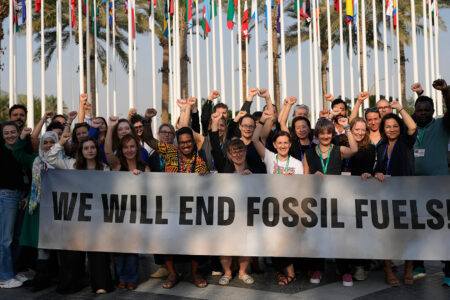
As the Harper government plots a way forward on energy policy, it should note the recent opinion piece posted on the smart Yale Environment 360 blog by former senators Timothy Wirth and Thomas Daschle. They argue that it’s time to abandon the push for a global climate treaty — unenforceable and politically unattainable anyway — and instead focus on a national drive to spur low-carbon energy solutions to global warming.
Both men are allies of the Obama administration on climate change issues (Wirth was the lead negotiator of the Kyoto protocol; both are close to John Podesta, the White House climate change whisperer). Some observers see the Wirth-Daschle call for a new approach to international negotiations as the moment the progressive establishment walked away from the dream of a binding global treaty.
The money passage from their piece:
We think the time has come for the international community to alter its collective climate strategy, cease the search for the impossible all-encompassing top-down agreement — described unattractively as “burden sharing” — and instead encourage an approach that builds on national self-interest and spurs a “race to the top” in low-carbon energy solutions. This would change the psychology of the climate change issue from one of burden to opportunity, and change the likely outcome from one of hand-wringing about failure to excitement about tangible action to build a better world.
This thinking offers Harper a way to reconcile his loathing of internationally binding agreements on emissions cuts with the need to develop an energy policy that is more sophisticated than just “drill baby drill.” The Obama administration’s newly minted regulations to reduce carbon emissions from coal-fired plants — though they face legal and political opposition — have altered the continental state of play on the energy-environment question. It’s time for Ottawa — always waiting for the next US step before acting — to adjust to new realities.
That means examining the geopolitical implications of potential US energy self-sufficiency. It requires asking whether next-generation nuclear has a place in a low-carbon energy mix, and taking the science on climate change seriously so we can make informed decisions about how to protect — or adapt to — the fallout from a hotter planet. All these questions and more require a made-in-Canada approach to the production and uses of energy.
Photo: Shutterstock by PopTika
Do you have something to say about the article you just read? Be part of the Policy Options discussion, and send in your own submission. Here is a link on how to do it. | Souhaitez-vous réagir à cet article ? Joignez-vous aux débats d’Options politiques et soumettez-nous votre texte en suivant ces directives.






